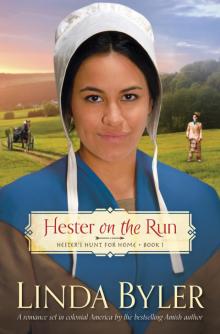- Home
- Linda Byler
Hester on the Run Page 7
Hester on the Run Read online
Page 7
“You know, they are peaceable people, the Lenape. I don’t believe they’ll ever make much trouble for us, except perhaps if we push them out of their land. Too much of that going on as it is.” Lissie spoke her thoughts out loud. “I’ll make dinner for you, before I leave,” she said, suddenly, getting up and asking what Kate was hungry for.
Kate was grateful and said she would love a good pot of deer stew—fresh venison, onions and carrots, thickened with cornmeal, just a bit—to eat with bread and molasses.
Lissie rumbled and buzzed around the house, teased the children, complimented the housekeeping, and then brought Kate a bowl of the fragrant stew. She filled one for herself and sat beside Kate’s bed to eat it. Ruth fed the children. The house smelled wonderful when Hans stepped through the door, Hester’s hand clutched firmly in his own. Seeing Lissie, the smile on his face became crooked, then disappeared entirely, as he let go of Hester’s hand.
Hester went to sit beside Noah to peer into his bowl. She took a bite of his bread, licked the molasses off her lips, then took another bite, a large one. When Noah protested loudly, Hans gripped his shoulder and gave it a shake.
“Let Hester have some, Noah.”
So Noah watched silently as Hester finished his bread and molasses. Isaac dropped his spoon, yelled loudly about it, and was given a smart rap on his shoulder from Hans. By that time, Lissie was visibly shaken, but, wise woman that she was, kept spooning up her stew, her eyes lowered.
Hans filled a bowl of stew for himself and one for Hester, then asked everyone to bow their heads in silent prayer. Lissie shot him a look of disrespect, yet she set her bowl on the small table beside Kate’s bed and bowed her head. But she didn’t pray, pretty sure the prayer wouldn’t be heard under these circumstances, when she felt like a teakettle ready to explode from the buildup of steam.
Isaac and Rebecca came to visit, clearly pleased, their faces wreathed in smiles at the arrival of the little namesake. She was short and plump, measuring only nineteen inches long, her eyes big and blue, her skin pink and healthy. Rebecca was so pleased, she unwrapped the baby, counted her fingers and toes, then, alarmed, quickly counted them again.
Kate watched the consternation on her motherin-law’s face.
“She … Wait a minute.”
Then, quietly, a mere whisper, “She has six fingers on one hand, Hans.” She said this to Hans, not Kate, as if he could do something about it if she told him first.
Hans moved swiftly to his mother’s side. He looked, his lips moving softly, his brows lowered.
“Yes, there are six.”
Kate didn’t care if she had seven fingers on one hand, she was a dear baby, another girl, and her love only expanded and wrapped itself about this newborn, same as all the others.
Hans’s eyes found Kate’s, accusing, begging her to fix it. He certainly did not want a disfigured child. She would be fa-shput (mocked). “Can you do something?” he asked quietly.
Her face white, Kate shrugged, holding the baby tightly to her breast as if to reassure herself they could not take her away because she had six fingers. Who would notice?
Rebecca would not hold the baby after her discovery, after seeing the extra finger. She had decided that Rebecca was, indeed, disfigured, unclean, as if she had leprosy.
The remainder of the evening crawled by, stilted, miserable. Kate wept after Hans’s parents left, but quietly, so he wouldn’t see.
After the children were put to bed, Ruth cleaned the kitchen and retired to her bedroom, quietly whispering a polite goodnight. Hans asked her how she enjoyed the new addition. Ruth blushed and said it was nice to have her own room.
He had built the addition because of his forethought, his wanting to provide well for his growing family. He had even built a second stone chimney for that time when they could have a small stove from England, the way wealthier families had. He had also constructed a long cupboard against the wall to hold the children’s clothes, another well-thought-out plan on his part.
Kate had so many things to be thankful for, how could she fret if Hans showed a bit of partiality among the children? Kate let her loyalty to Hans edge out Lissie’s warning, bolstered by her resentment, too, that Lissie had intruded into their private lives.
Lots of families lived with unequally divided love. Kate remembered that her sister Fannie, a year younger than herself, was most certainly favored by their mother as her skilled fingers produced one work of embroidery after another. Sometimes you had to accept life for what it was and not what you wanted it to be.
Hans came to Kate’s bed and lay down beside her. Quietly, he held her hand, his thumb caressing the back of it over and over.
“Kate,” he said softly, “I really want to know if there’s nothing to be done about the extra finger. What caused something like that in the first place?” His voice quivered like a little boy’s, and Kate turned her head to watch her husband’s face. There was real fear in his eyes when he turned toward her.
“Is God punishing us for something we have done, that our babies are not perfect?”
“What do you mean, Hans?”
The firelight played across her husband’s features, creating a dancing yellow light in his eyes, changing their color and expression, fascinating her.
“I feel I have sinned, that our baby has six fingers.”
“Why?”
“I don’t know. Sometimes I have impure thoughts.”
“Oh, Hans, confess to God. He will forgive if you are truly contrite.”
“I don’t know why I carry this burden of guilt, but I do.”
“If it helps, you can confess to the church. I’m sure John would help you with your confession.”
“Oh no, no. I can’t do that. It’s only fleeting. It’s not that bad. Sometimes it seems as if it raises itself, and I can’t stop the thoughts that go through my head.”
“Pray about it, Hans. Ask God to help you.”
“I will.”
When he leaned across the baby to kiss her, an involuntary shudder passed through her, and she turned her face away, his lips reaching the formal presentation of her cheek.
When Hans rolled on his side and slept, Kate’s eyes remained wide open, her thoughts racing, unable to sleep. Why would Hans have this trouble? Was it Ruth, the hired girl? She’d have to keep an eye on her, for sure, but she’d never noticed one single flirtatious move from the dear, shy girl. She was so hardworking, bless her heart.
Kate’s thoughts traveled across the community, the young women and girls, none of them holding the least bit of suspicion even for a second. Oh, well, perhaps it was only a passing thing. Hans was young, and the devil strode about like a lion, seeking whom he may devour, she reasoned. She would be sure to perform all her wifely duties well, obey him in everything, and God would bless them.
Sometimes she could hardly grasp the fact they had been childless all that time. Nine and a half years. And now she was thirty-five years old and had five children. If this continued, she’d have five more by the time she was forty. My, oh.
She hid a smile now. Poor Hans. Why did he think that sixth finger was so awful? His parents were given to myths and old wives’ talk entirely too much. Rebecca had told her once that when the moon was full, people lost their minds much easier, and that bad skin came from eating grapes before they were ripe.
She’d ask Lissie. She’d know.
And Lissie did know. She laughed out loud, said she must be getting old. How did she miss that extra finger?
Well, it was no problem whatsoever. She plied the limp finger gingerly, testing its strength, then took a length of string and tied it firmly at the base, saying it would fall off in a few weeks.
Kate nodded. She knew it would not cause the baby pain, and Hans would be relieved of his burden of guilt. The poor man, he worked so hard to support all of them; he certainly did not need the added load of wrongdoing.
When Baby Rebecca was six weeks old, summer was upon them once more. Kat
e was rested and energetic and threw herself into the work of cleaning her house thoroughly. She sent the children outside to play, then opened the windows, shaved strong lye soap into buckets of steaming water, and scrubbed and swept and polished and waxed until the house shone with cleanliness. It was their turn to have church in two weeks, and Kate was in a frenzy of activity. No one was going to come to their farm and find anything unkempt or slovenly. Not the barn, surrounding fields, the garden, or the house.
Hester and Noah pulled weeds, crawling around the rows of beans and corn, throwing weeds into the wooden bucket Kate gave them. They worked all morning, stopping only to imitate the calls of birds or to watch a timid deer walk across the field with its tiny fawn.
Hans praised Hester’s efforts warmly, then tousled Noah’s hair with the palm of his hand. Kate’s heart ached to see Noah’s face light up by this one infrequent gesture, almost an afterthought, but it was a crumb of blessing Noah grasped eagerly. His father had touched him, and it was a benediction, a feeling that was almost holy in a way only little boys know.
Hester was pleased for Noah as well. She was always glad when Hans was nice to the boys, her heart pure and unselfish, the way she’d been since the day she arrived.
As Lissie had predicted, the extra finger on Rebecca’s hand lay in the cradle one morning, leaving a funny looking spot on her hand. Kate took up the tiny finger, buried it in the woods behind the house, put a salve on the place where the finger had been, and never spoke of it to anyone after that.
When the first cart drove around the turn in the road and came to church services at Hans Zug’s farm, the men’s practiced eyes appreciated the amount of forest Hans had cleaned since last time they’d had services, the green of the cornfields, the size of the tobacco plants.
The women gazed at Kate’s garden and wondered aloud to their husbands how that busy woman got all her work done the way she did. Did she get up at four o’clock every single morning? She wasn’t getting any thinner, said the more mean-spirited ones. Those who held a generosity of spirit were quick to praise, asking Kate, indeed, how did she do it?
Kate blushed and became quite pink and flustered. She said her children were good and helped in the garden, which sounded dumb to her own ears, but she hardly knew what else to say, since praise of any kind was a bit foreign. Not that that was Hans’s fault. Of course she knew he appreciated her efforts most of the time.
Hester appeared especially pretty, wearing a new dress in a light shade of green, setting off the caramel hue of her skin. Her eyes were darker than ever, the dress that was buttoned around her neck giving her skin an almost olive hue.
Old Mamie Troyer watched the Indian child and clucked internally, her expression giving nothing away. Why wouldn’t Lissie and Rebecca have a dress of the same color? Or Kate, for that matter? Perhaps Hester had an indulging aunt or cousin who presented her with these brilliant shades.
None of it was any of her business, so she would let it alone. That was best. Her eyes followed the graceful, fawnlike movements of the child, caught the glistening blue of her black hair, and thought if she was Kate, she’d pull that white cap front further over her hair. But maybe it was Kate herself who dressed her in that finery.
The sun shone warmly, and the green leaves of the trees dappled the earth as the women walked solemnly to the barn, where Hans had spread the clean straw and set the wooden benches. The barn below was also as clean as a whistle, without a trace of manure anywhere.
Silently, the women filed in, their heads bent, eyes lowered in submission, and sat down, spreading their skirts smoothly across their laps, setting their bare feet neatly on the floor. They never crossed their legs or bounced their knees or feet. This was the Lord’s Sabbath, and they were to respect it as such.
When the strains of a man’s baritone reached their ears, they waited respectfully until the first line was finished, then joined in, their high soprano voices blending well with the men’s deeper voices.
The summer breezes played with the golden straw, as Hans sat with his sons by the opened doorway. Flies buzzed about, a bumblebee droned by, a butterfly made its crazy way along, wings fluttering as it veered left and right.
Hester was making her way to her father between the benches, sliding her bare feet along in the slippery yellow straw. Her eyes caught the butterfly’s movement, following it until it was out of sight. It was only then that she completed her walk to Hans, who pushed Noah over to make room for Hester close to him. He bent his head and smiled at her, receiving her smile in return. Isaac leaned forward, smiling at his father, but the smile Hans gave Hester never reached Isaac, disappearing as Hans focused on Hester. Isaac sat back, sighed, kicked his bare heels below the bench, clasped his hands, and looked for something else to hold his interest.
Rebecca was crying, so Kate took Lissie’s hand and walked to the house beneath the waving maple trees overhead. The slow, undulating chant of the German words swirled about her, filling her heart with gratitude for this warm day, the sunshine, the fair weather, and the added blessing of having services in their barn, the mothers making their way back and forth to the house with crying babies.
God was in his heaven, as Hans would say, sending his love in the form of nature, the wonders of it abounding everywhere she looked.
Rebecca had cried herself into a red-faced screaming frenzy, so Kate was at the cradle in a few long strides, raising her to her shoulder with the blanket trailing after her, patting and crooning until the baby quieted. She sat down on the rocking chair to feed her. Looking around the house, she was glad the walls were whitewashed, the furniture polished, the floors clean and gleaming, her expertise at housekeeping so evident.
Her close friend Sarah emerged from the bedroom and said it would be wonderful to have a new addition put on her house. Kate was fortunate to have a hardworking man like Hans. Sarah spoke wistfully, her fear of being overheard evident in the slant of her eyes, the discreet touch of her hand to her mouth.
Kate let all the blessings of her life soak into her heart, saturating it with a bounty of gratitude. She loved Hans with all her heart, his four sweet children she had borne, and adorable Hester, the jewel in Hans’s crown. If his love and devotion was a bit lopsided, she could overlook it, no matter what that suspicious Lissie tried to instill in her, whittling away at every bit of faith she had in her hardworking husband.
And so she smiled at Sarah, acknowledged her praise with a thankful heart, and assured her friend that, in time, she would have a larger home as well. Sarah’s eyes shone warmly, her smile genuine, but with a veil of sadness that alarmed Kate. It was transparent, but barely. Kate looked deeply into Sarah’s eyes, lifting her eyebrows in question. But Sarah shook her head, pulled her upper lip down to catch it with her lower one, drawing a curtain of privacy in front of herself as she did so.
Kate had to be satisfied with the puzzlement she carried with her in the coming weeks.
CHAPTER 7
IT WAS ONLY A FEW MONTHS OVER A YEAR LATER that Solomon came into their lives, a red-faced, squalling son who tipped Lissie Hershberger’s scales at ten pounds, three ounces. His head was large and well rounded, slick as the new moon. He began his crying within the first hour, and it hardly ever came to an end day or night, his hoarse cries stopping only when he fell asleep. It was those short naps that restored Kate’s sanity.
Rebecca remained small and thin, a sickly child who lost her appetite easily and was prone to high fevers. So when the winter winds slammed against the little gray house, shaking it to its teeth, Kate stirred up the fire on the hearth and added more logs, keeping fear and panic at bay by telling herself the fever was coming down now.
For days, she’d lain, her little Rebecca, the fever causing her to cry out with chills, feeling as if she were frozen. Then she’d kick and scream when the heat from her fever became unbearable.
Kate washed her little body with cool vinegar water and fed her echinacea and garlic. She soaked strips of elm ba
rk in boiling water and gave her the cooled liquid, but nothing seemed to help.
Solomon kept on fussing and crying, sometimes reverting to short gasping screams, his face turning purple with the noise.
Kate held her mouth in a thin line as she moved through the small house from one to the other. The rest of the children played around her, sometimes squabbling, but she could usually nip the uprising in the bud by a firm twist of an ear or a pinch of forearm flesh between her strong fingers.
Hans was away much of the time, shoeing horses. Kate wondered if that was really what he was doing, but she reasoned that Solomon’s crying was very hard on Hans, that his nerves simply couldn’t take it. The poor man seemed not to be able to put up with such a racket, and her own ministrations were simply not enough to make Solomon stop crying. She would need to redouble her efforts, to make Hans’s time in the house with his family more pleasant.
Hester was a big help now at five years of age, growing taller, her jet black hair as straight and thick as a horse’s mane. Kate wet her hair down, drew it back, braided it into severe braids, and then coiled the braids around the back of her head as tightly as possible. She unwound and combed her hair only once a week.
Her eyes were large, if anything a bit elongated like almonds, her nose tiny and flat, with delicate nostrils, her mouth wide and full, her skin a beautiful brown hue. Everyone noticed Hester, including visitors to the Amish church. Some of them stared, others gasped, and then felt ashamed at their lack of good manners. Kate was accustomed to this and found it mildly humorous, sometimes a bit disconcerting, but she never felt afraid. What harm could come to her beautiful child? For that was all she was, a child.
That evening when Hans came home, he went straight to Solomon’s cradle, picked him up, and held him. He looked into his face and told Kate he was changing his looks. He believed he resembled her more and more.

 A Second Chance
A Second Chance Lizzie's Carefree Years
Lizzie's Carefree Years The More the Merrier
The More the Merrier Love in Unlikely Places
Love in Unlikely Places Running Around (and Such)
Running Around (and Such) Wild Horses
Wild Horses Lizzie Searches for Love Trilogy
Lizzie Searches for Love Trilogy Lizzie and Emma
Lizzie and Emma Little Amish Matchmaker
Little Amish Matchmaker The Witnesses
The Witnesses The Healing
The Healing Home Is Where the Heart Is
Home Is Where the Heart Is Fire in the Night
Fire in the Night When Strawberries Bloom
When Strawberries Bloom Little Amish Lizzie
Little Amish Lizzie Which Way Home?
Which Way Home? The Homestead
The Homestead Sadie’s Montana Trilogy
Sadie’s Montana Trilogy Davey's Daughter
Davey's Daughter Hester on the Run
Hester on the Run Disappearances
Disappearances Big Decisions
Big Decisions Becky Meets Her Match
Becky Meets Her Match Hope on the Plains
Hope on the Plains Christmas Visitor
Christmas Visitor